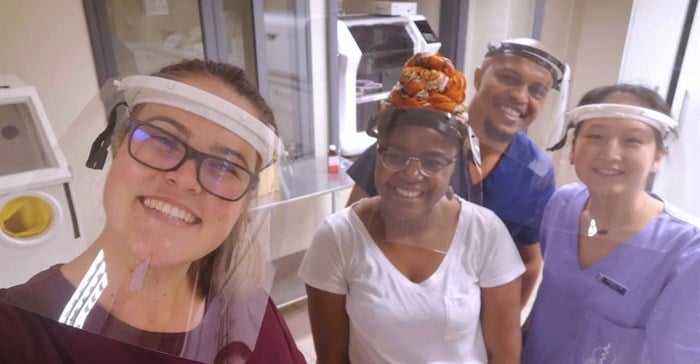TygerMaties 3D print protective gear in fight against Covid-19

Yet that is what’s happening as staff and students are work long hours to 3D print and assemble visors to be distributed and used as protective gear for those working on the frontline of fighting the Covid-19 crisis.
Dr Rudolph Venter, an orthopaedic surgeon and lecturer in clinical anatomy at SU’s Faculty of Medicine and Health Sciences (FMHS) came up with the idea after the virus broke out in South Africa.
“I thought, why not put the 3D printing lab to good use by producing some kind of protective gear for the healthcare workers working with patients?” said Venter. After consultation with Tygerberg Hospital management, face shields were identified as an immediate need.
“There is a burgeoning community of people all over world using 3D printers and laser cutters to produce equipment for healthcare workers, sharing designs and refining them, all being shared freely online - it is beautiful to see,” said Venter.
He and his team downloaded a design that met a range of different criteria and started sourcing the material to make them.
“The headgear comprises a plastic headband to which you attach a clear visor, with elastic to attach it to the wearer’s head. We approached local suppliers who sold sheets of clear plastic and elastic and used a few rolls of 3D printing filament that we had in stock in our lab.”
Network of community volunteers
The Head of the Division of Orthopaedic Surgery, Professor Jacques du Toit made funding available to purchase some of the materials and kick-start the process.
“We soon realised that we were not going to make much of a difference with just one printer, so we approached the SU’s Faculty of Engineering, and Professor Kristiaan Schreve, head of mechanical engineering, very graciously put all the 3D printers they could spare at our disposal," says Venter.
It didn’t take long before Venter also had a network of community volunteers producing the same design on their home 3D printers. A local engineering firm, Rapid 3D donated 10 more rolls of filament and consumables for the printers being used. Another donation was from Curro schools head office, which donated 20 more of the visors.
Volunteer student projects
Venter then contacted Luné Smith, a fifth-year medical student who, along with a fellow student Abdul-Mutakabit Aziz helped set up a student-volunteer initiative when the pandemic broke out in South Africa. Hundreds of medicine and health sciences students at the FMHS have opted to use their recesses to play their part in fighting the virus.
Smith runs the WeFightBack Covid committee which is involved in five student-volunteer projects, ranging from a community mask initiative; to making spacers for metered dose inhalers to use in place of nebulisation to treat Covid-19 patients; to a support project for people in kangaroo mother care wards and lodger areas, as well as an education initiative relating to the virus.
Smith and her team have taken over the logistics of the 3D printing project, on top of their other projects.
“We take care of all the odd jobs, including dropping off the plastic for the community volunteers to print the masks; picking up the printed masks; picking up materials for making the visors as well as putting them together – cutting them out, measuring them and assembling the product,” she says.
The students assembling the visors are working in the orthopaedic surgery department, in shifts of four or five people at a time so as to maintain social distancing.
“After our stocktake today (6 April), we are proud to report 134 visors are ready to go, with more on the way,” says Smith.
























